Background
NORTH, Douglass Cecil was born in 1920 in Cambridge, Massachusetts, United States of America.

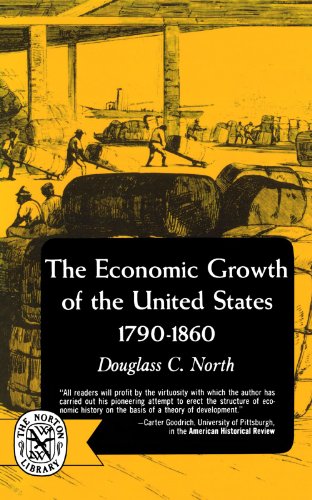
( "All readers will profit by the virtuosity with which t...)
"All readers will profit by the virtuosity with which the author has carried out his pioneering attempt to erect the structure of economic hisotry on the basis of a theory of development." —Carter Goodrich, American Historical Review "On the eve of the Civil War the United States had already achieved rapid and sustained economic expansion. We had filled out our territorial boundaries, and the frontier was already encroaching upon the parched lands in the lee of the Rocky Mountains and moving east of the Sierra Nevadas. We were an industrial nation second only to Britain in manufacturing. Our expansion had been matched by an acceleration of economic well-being. The obstacles to American economic growth had been removed before the Civil War took place. That war was a costly and bitter interruption." Integrating economic theory, history, and statistics in this provocative study, Professor North develops a fresh interpretation of the sources and determining factors of United States growth from the founding of the nation to the Civil War. From 1970 to 1814 economic development is seen primarily as a result of external influences. From 1815 to 1860 the westward movement and the transformation to an industrial economy provided accelerating influences on the nation's growing prosperity. Professor North concludes that the export trade, particularly in cotton, was of prime importance as a stimulant to the economy. And he emphasizes the cornerstone of growth was the spread of a market economy, which attracted "an increasing percentage of resources into production for the market and out of pioneer self-sufficiency."
http://www.amazon.com/gp/product/0393003469/?tag=2022091-20

( Intended primarily for principles of economics, publi...)
Intended primarily for principles of economics, public policy, and social issues courses, this text also provides practical content to current and aspiring industry professionals. Brief, relevant readings that spark independent thinking and classroom discussions. The Economics of Public Issues is a collection of brief, relevant readings that spark independent thinking and classroom discussions in Principles of Economics and Social Issues courses. This text encourages readers to apply theoretical discussions to today’s important issues and to gain a deeper understanding of current economic policy concerns.
http://www.amazon.com/gp/product/0133022935/?tag=2022091-20

( Brief, relevant readings that spark independent thinkin...)
Brief, relevant readings that spark independent thinking and classroom discussions The Economics of Public Issues is a collection of brief, relevant readings that spark independent thinking and classroom discussions in Principles of Economics and Social Issues courses. This text encourages readers to apply theoretical discussions to today’s important issues and to gain a deeper understanding of current economic policy concerns.
http://www.amazon.com/gp/product/0134018974/?tag=2022091-20

(The Economics of Public Issues is a collection of brief, ...)
The Economics of Public Issues is a collection of brief, relevant readings that spark independent thinking.
http://www.amazon.com/gp/product/0138021139/?tag=2022091-20

(KEY BENEFIT: The Economics of Public Issues 16e is a coll...)
KEY BENEFIT: The Economics of Public Issues 16e is a collection of brief, relevant readings that spark independent thinking. KEY TOPICS: The Foundations of Economic Analysis; Supply and Demand; Labor Markets; Market Structures; Political Economy; Property Rights and the Environment; Globalization and Economic Prosperity MARKET: For readers interested in applying theoretical discussions to today’s important issues and gaining a deeper understanding of current economic policy concerns.
http://www.amazon.com/gp/product/032159455X/?tag=2022091-20

( The Economics of Public Issues is a collection of brief...)
The Economics of Public Issues is a collection of brief, relevant readings that spark independent thinking and classroom discussions in principles of economics, public policy, and social issues courses. The Foundations of Economic Analysis: Death by Bureaucrat; Ethanol Madness; Flying the Friendly Skies?; The Mystery of Wealth. S upply and Demand: Sex, Booze, and Drugs; Expanding Waistlines; Is Water Different?; Slave Redemption in Sudan; Smoking and Smuggling; Bankrupt Landlords, from Sea to Shining Sea. Labor Markets: (Why) Are Women Paid Less?; The Effects of the Minimum Wage; Immigration, Superstars, and Poverty; A Farewell to Jobs. Market Structures: Monopsony and Competition in Health Care; Big Oil, Big Oil Prices?; Contracts, Combinations, and Conspiracies; Coffee, Tea, or Tuition-Free?; College Costs (…and Costs and Costs); Keeping the Competition Out; Political Economy: Raising Less Corn and More Hell; Killer Cars and the Rise of the SUV; Crime and Punishment; The Graying of America; Heavenly Highway. Property Rights and the Environment: The Trashman Cometh; Bye-Bye, Bison; Smog Merchants; Greenhouse Economics. International Trade and Economic Prosperity: Free Trade, Less Trade, or No Trade?; The $750,000 Steelworker; The Lion, the Dragon, and the Future. For all readers interested in principles of economics, public policy, and social issues..
http://www.amazon.com/gp/product/0321416104/?tag=2022091-20
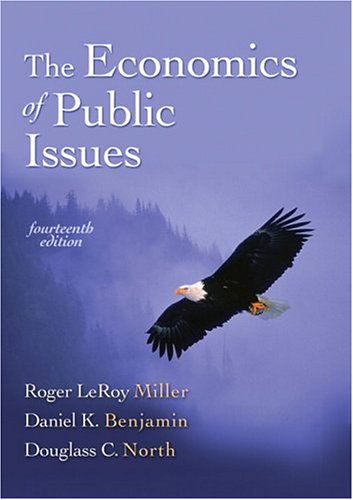
(For thirteen editions, The Economics of Public Issues has...)
For thirteen editions, The Economics of Public Issues has sparked debate and discussion in economics classrooms, vividly illustrating for generations of students the power of economics as a tool for analyzing issues with which they are already familiar. This Fourteenth Edition offers provocative new topics to illustrate economic principles through a contemporary lens. The authors' clear presentation and straightforward applications make the study of economics entertaining and informative. The Economics of Public Issues is an essential source of engaging, relevant readings for a principles of economics course, and an excellent way to spark independent thinking and classroom discussions in political economy, public policy, and social issues courses.
http://www.amazon.com/gp/product/0321303490/?tag=2022091-20
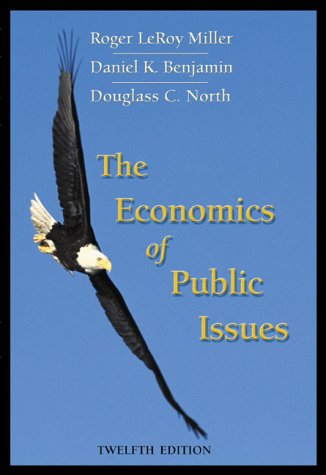
(For years, The Economics of Public Issues has shown stude...)
For years, The Economics of Public Issues has shown students the power of economics in explaining the world around us. The twelfth edition continues the tradition of illustrating traditional economic principles through contemporary issues by offering eight all-new chapters on compelling topics such as the economics of traffic jams, slave redemption in Sudan, and the Microsoft monopoly. The authors' clear presentation and straightforward applications make the study of economics entertaining and informative. The Economics of Public Issues is an essential source of engaging, relevant readings for a principles of economics course, and an excellent way to spark independent thinking in political economy, public policy, and social issues courses.
http://www.amazon.com/gp/product/0321079159/?tag=2022091-20
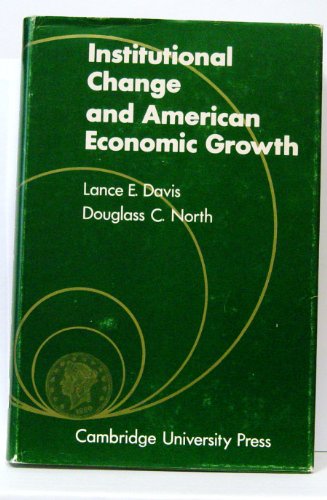
(This book presents a model for examining problems of inst...)
This book presents a model for examining problems of institutional change and applies it to American economic development in the nineteenth and twentieth centuries. The authors develop their model of institutional change. They argue that if external economic factors make an increase in income possible but not attainable within the existing institutional structure, new organizations must be developed to achieve the potential in income. Their model is designed to explain the type and timing of these necessary changes in institutional organization. Individual, voluntary cooperative, and governmental arrangements are included in the discussion, although the latter differs considerably from the first two.
http://www.amazon.com/gp/product/0521081114/?tag=2022091-20
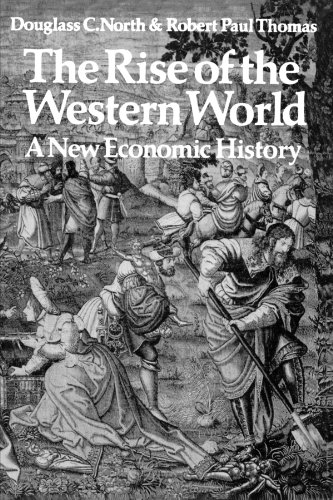
(First published in 1973, this is a radical interpretation...)
First published in 1973, this is a radical interpretation, offering a unified explanation for the growth of Western Europe between 900 A. D. and 1700, providing a general theoretical framework for institutional change geared to the general reader.
http://www.amazon.com/gp/product/0521290996/?tag=2022091-20
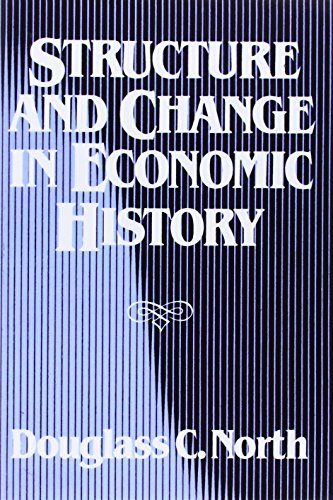
( In this bold, sweeping study of the development of West...)
In this bold, sweeping study of the development of Western economies, Douglass C. North sets forth a new view of societal change. At the core of Professor North's investigation is the question of property rights, the arrangements individuals and groups have made through history to deal with the fundamental economic problem of scarce resources. In six theoretical chapters, Professor North examines the structure of economic systems, outlines an economic theory of the state and the ideologies that undergird various modes of economic organization, and then explores the dynamic forces such as new technologies that cause institutions to adapt in order to survive. With this analytical framework in place, major phases in Western history come under careful reappraisal, from the origins of agriculture and the neolithic revolution through the political economy of the ancient and medieval worlds to the industrial revolution and the economic transformations of the twentieth century. Structure and Change in Economic History is a work that will reshape many established explanations of the growth of the west.
http://www.amazon.com/gp/product/039395241X/?tag=2022091-20

( In this bold, sweeping study of the development of West...)
In this bold, sweeping study of the development of Western economies, Douglass C. North sets forth a new view of societal change. At the core of Professor North's investigation is the question of property rights, the arrangements individuals and groups have made through history to deal with the fundamental economic problem of scarce resources. In six theoretical chapters, Professor North examines the structure of economic systems, outlines an economic theory of the state and the ideologies that undergird various modes of economic organization, and then explores the dynamic forces such as new technologies that cause institutions to adapt in order to survive. With this analytical framework in place, major phases in Western history come under careful reappraisal, from the origins of agriculture and the neolithic revolution through the political economy of the ancient and medieval worlds to the industrial revolution and the economic transformations of the twentieth century. Structure and Change in Economic History is a work that will reshape many established explanations of the growth of the west.
http://www.amazon.com/gp/product/039395241X/?tag=2022091-20
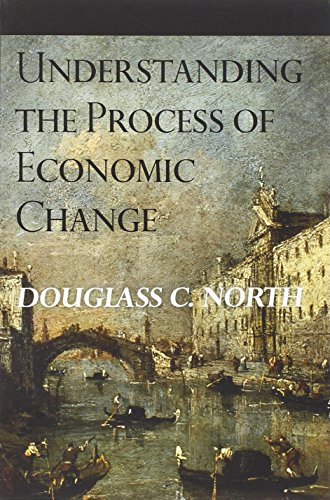
( In this landmark work, a Nobel Prize-winning economist ...)
In this landmark work, a Nobel Prize-winning economist develops a new way of understanding the process by which economies change. Douglass North inspired a revolution in economic history a generation ago by demonstrating that economic performance is determined largely by the kind and quality of institutions that support markets. As he showed in two now classic books that inspired the New Institutional Economics (today a subfield of economics), property rights and transaction costs are fundamental determinants. Here, North explains how different societies arrive at the institutional infrastructure that greatly determines their economic trajectories. North argues that economic change depends largely on "adaptive efficiency," a society's effectiveness in creating institutions that are productive, stable, fair, and broadly accepted--and, importantly, flexible enough to be changed or replaced in response to political and economic feedback. While adhering to his earlier definition of institutions as the formal and informal rules that constrain human economic behavior, he extends his analysis to explore the deeper determinants of how these rules evolve and how economies change. Drawing on recent work by psychologists, he identifies intentionality as the crucial variable and proceeds to demonstrate how intentionality emerges as the product of social learning and how it then shapes the economy's institutional foundations and thus its capacity to adapt to changing circumstances. Understanding the Process of Economic Change accounts not only for past institutional change but also for the diverse performance of present-day economies. This major work is therefore also an essential guide to improving the performance of developing countries.
http://www.amazon.com/gp/product/0691145954/?tag=2022091-20

(First published in 1973, this is a radical interpretation...)
First published in 1973, this is a radical interpretation, offering a unified explanation for the growth of Western Europe between 900 A. D. and 1700, providing a general theoretical framework for institutional change geared to the general reader.
http://www.amazon.com/gp/product/0521290996/?tag=2022091-20
NORTH, Douglass Cecil was born in 1920 in Cambridge, Massachusetts, United States of America.
North went to elementary school in Ottawa, and then to a private secondary school. When he moved back to the United States in 1933, he went to private schools in New York City and on Long Island, and then completed his high school education at the Choate School in Wallingford, Connecticut. While he was there he became deeply interested in photography, and indeed the most noteworthy event in his early life was winning first, third, fourth and seventh prizes in an international competition for college and high school students.
He was accepted at Harvard at the same time that his father became the head of MetLife on the west coast, so North opted to go to University of California, Berkeley. In 1942, he graduated with a B.A. in General Curriculum-Humanities. Although his grades amounted to slightly better than a "C" average, he managed to complete a triple major in political science, philosophy and economics.
Graduate Teaching Fellow, University California Berkeley, 1946-1949. Professor of Economics, Director, Chairman, Institute, Institution Economics Research, University Washington, 1950-1961,
6, 1967-1969. Peterkin Professor Polit Economics, Rice University, Houston, Texas, 1979.
Pitt Professor, University of Cambridge, Cambridge, United Kingdom, 1981-1982. Henry R. Luce Professor Law and Liberty, Washington University, St Louis, Missouri, United States of America, since 1982. Co-editor, Journal of Economic History, 1960-1966.
Board of Directors, National Bureau of Economie Research, New York, New York, United States of America, since 1967. Board Trustees, Economics Institute, Institution, 1968, 1971, 1978. President, Economie History Association, USA,
Visiting Association Director, Centre de Recherche Historique, Ecole Pratique des Hautes Etudes, Paris, 1973. President, Western Economic Association, USA 1975-1976.
( Brief, relevant readings that spark independent thinkin...)
(For thirteen editions, The Economics of Public Issues has...)
( The Economics of Public Issues is a collection of brief...)
( "All readers will profit by the virtuosity with which t...)
( Intended primarily for principles of economics, publi...)
(This book presents a model for examining problems of inst...)
(First published in 1973, this is a radical interpretation...)
(First published in 1973, this is a radical interpretation...)
( In this landmark work, a Nobel Prize-winning economist ...)
(KEY BENEFIT: The Economics of Public Issues 16e is a coll...)
(For years, The Economics of Public Issues has shown stude...)
(The Economics of Public Issues is a collection of brief, ...)
( In this bold, sweeping study of the development of West...)
( In this bold, sweeping study of the development of West...)
(book)
Discussion of the increase in transactions costs in the United States (resources devoted to political and economic organisation) reflected in the growth of government and the parallel institutional and market responses.
Development of a model of the growth of the American economy from 1790- 1860. Discussion of the usefulness of applying simple neoclassical theory to problems in American economic history. And development of a general model of institutional change, and its application to the economic history of the Western world.
Empirical contributions have included development of the balance of payments from 1790-1860. The export/ import price indices of the United States from 1790-1860. And an index of the productivity of ocean shipping from 1600-1914.
foundation of the International Society for the New Institutional Economics
foundation of the International Society for the New Institutional Economics
